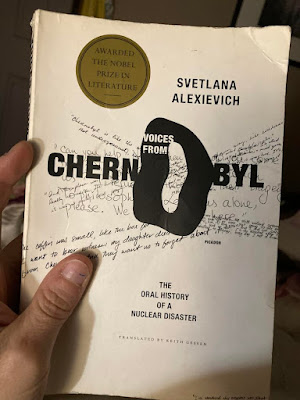Voices from Chernobyl: The Oral History of a Nuclear Disaster, edited by Svetlana Alexievich
I ran across this at the library last month, read it quickly and will likely check it out and read it again. The book is a collage of testimonies from those who experienced the Chernobyl nuclear meltdown, arranged in time from the first fires to years after. The stories come from wives of firemen who were first called to the scene and died horrible deaths a few weeks later. There are the voices of scientists begging people to evacuate (and the people dismissing the advice as ludicrous); the government's myth-making about the low level of concern people should have; the people summoned to the site to evacuate people or to fight the fires or to bury the earth, machines, houses--all while imbibing quarts of vodka due to the myth that the vodka functioned as a bodily barrier to the nuclear radiation. The stories range from long to short anecdotes to singing snippets that altogether accumulate to create the vivid, complicated, and awful event and its effect on the immediate environment, animals, and people--as well as the effects over time to those who returned to live in the zone, those mourning, and those later born (or born dead).
The reading experience is like that of Hiroshima by John Hersey, and it's impossible not to draw connections between the two, not only because both deal with the sudden effects of nuclear disaster but also in the way brightly strange reality that ensues (fir example, in Chernobyl, abandoned pets being shot by soldiers so that they don't wander outside of the zone; in Hiroshima, the electric blue flowers that start growing over the bomb site)
It is a well-built book that stunned me.
I'd suggest adding it to the top of your stack of necessary reading.
🕮
